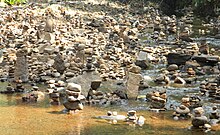From Wikipedia, the free encyclopedia
Hindu temple in Karnataka
Kukke Subramanya (IAST : Kukke Subrahmaṇya ) is a Hindu temple in the village Subramanya in Kadaba taluk (previously in Sullia taluk) in Dakshina Kannada district , Karnataka, India. Kartikeya is worshipped as Subramanya, lord of all serpents in the temple. Epics say that the divine serpent Vasuki and other serpents found refuge under Subramanya when threatened by the Garuda . The priests in the temple are Shivalli Madhwa Brahmins . The poojas and other daily rituals in the temple are performed as per Madhvacharya 's Tantra Sara Sangraha .[ 1]
Kukke Subrahmanya Temple River in front of the temple The Kukke Subramanya Temple is located in the Western Ghats range of Karnataka , under the mountain Kumara Parvatha .[citation needed
Amrutesvara Temple, Amruthapura Ananthasayana temple Anekere Annapoorneshwari Temple Annigeri Antara Gange Avani, Kolar Badami Cave Temples Balligavi Banashankari Amma Temple Banashankari Temple, Amargol Banavasi Bankapura Begur, Bangalore Brahmeshvara Temple, Kikkeri Bucesvara Temple, Koravangala Bhoganidishvara, Chikkaballapur district Bhutanatha group Chamundeshwari Temple Chamundeswari Temple Chandramouleshwara Temple Chaudayyadanapura Cheluvanarayana Swamy Temple Chennakeshava Temple, Belur Chennakeshava Temple, Aralaguppe Chennakesava Temple, Somanathapura Chitrapur Math Chowdeshwari Temple Devarayana Durga Dharmaraya Swamy Temple Dharmasthala Temple Dodda Ganeshana Gudi Doddabasappa Temple Dambal Durga temple, Aihole Gadag-Betigeri Kalakaleshwara Temple Gajendragad Galaganatha Gaurishvara Temple, Yelandur Gavi Gangadhareshwara Temple Godachi Gokarnanatheshwara Temple Halasi Halasuru Someshwara Temple Hangal Harihareshwara Temple Panchalingewara Temple Hooli Hoysaleswara Temple Hulimavu cave Temple Ganesha Temple, Idagunji Ikkeri Ishvara Temple, Arasikere Itagi Bhimambika Kadri Manjunath Temple Kaitabheshvara Temple, Kubatur Kalasa Kalghatgi Kalikamba Temple Kalleshvara Temple, Ambali Kalleshvara Temple, Aralaguppe Kalleshvara Temple, Bagali Kalleshwara Temple, Hire Hadagali Kamala Narayana Temple Belagavi Kanakagiri Karighatta temple Karikanamma Kasivisvesvara Temple, Lakkundi Kedareswara temple, Halebidu Kedareshvara Temple, Balligavi Keladi Keshava Temple Kodlamane Shree Vishnumurthy Temple Kodandarama Temple Koodli Kote Venkataramana Temple Kotilingeshwara Krauncha Giri Kudalasangama Kudroli Bhagavathi Kukke Subramanya Temple Kuknur Kumara Swamy Devasthana, Bangalore Kundgol Kurudumale Kuruvathi Basaveshwara temple Lad Khan Temple Lakkundi Lakshmeshwar Lakshmi Devi Temple, Doddagaddavalli Lakshmi Narasimha Temple, Bhadravati Lakshminarasimha Temple, Haranhalli Lakshminarasimha Temple, Javagal Lakshmi Narasimha Temple, Nuggehalli Lakshminarayana Temple, Hosaholalu Male Mahadeshwara Hills Mahabaleshwar Temple, Gokarna Maha Ganapathi Mahammaya Temple Mahadeva Temple, Itagi Mahakuta group of temples Mallikarjuna Temple, Basaralu Mallikarjuna Temple, Kuruvatti Mandarthi Mangaladevi Temple Maranakatte Mariyamma Temple Melukote Mookambika Temple, Kollur Mudukuthore Mundkur Sri Durgaparameshwari Temple Murudeshwara Mylara Lingeshwara Temple Nandi Temple Nagamangala Nageshvara-Chennakeshava Temple complex, Mosale Navalinga Temple Narasimha Jhira Cave Temple, Bidar Nellitheertha Cave Temple Padutirupathi Panchalingeshwara temple, Govindanahalli Pattadakal Polali Rajarajeshwari Temple Ragigudda Anjaneya Temple Rameshvara Temple, Narasamangala Ranganathaswamy Temple, Bangalore Sadasiva Temple Saundatti Sharana Basaveshwara Temple Shree Vishnumurthy Temple Shri Vinayaka Shankaranarayana Durgamba Temple Sringeri Sringeri Sharadamba Temple Siddhesvara Temple Haveri Srikanteshwara Temple, Nanjangud Sirsangi Kalika Temple Kolar Someshwara Temple Sri Ranganathaswamy Temple, Shivanasamudra Sri Ranganathaswamy Temple, Srirangapatna Sri Vinayaka Temple, Guddattu Sudi Talagunda Talakad Tamboor Temples in Tulunadu Temples of North Karnataka Thirunarayanapuram Timmalapura Trikuteshwara Temple Gadag Tripurantaka Temple Turuvekere Udupi Sri Krishna Matha Veera Narayana Temple, Belavadi Vijayanarayana Temple, Gundlupet Virupaksha Temple Western Chalukya temples Yediyur Siddhalingeshwara Swamy Temple Yelluru Shri Vishweshwara Temple




